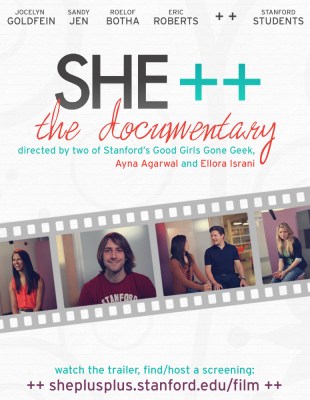She++, a Stanford community for women in tech, released a 12-minute documentary today featuring Stanford students, professors and alumni discussing gender in technical fields.
In the documentary, high-profile Silicon Valley leaders Kimber Lockhart, a Director of Engineering at Box; Tracy Chou, a software engineer at Pinterest; Jocelyn Goldfein, a Director of Engineering at Facebook; Sandy Jen, CTO and co-founder of Meebo; and Roelof Botha, a partner at Sequoia Capital, share their experiences with gender in the classroom and workplace.
Two Stanford seniors, Ayna Agarwal and Ellora Israni founded she++ in 2012. Since then, the two have hosted two conferences, produced the documentary, and started a mentorship program.
“I wanted to share a story that could relate to girls who had parents as doctors, or girls whose parents did not go to college,” Agarwal says. “I did not want to just target the mainstream communities in the Silicon Valley, nor the high schools dominated by surrounding technical influences. The point was to widen our reach, and make the story accessible and relatable.”
The documentary has been screened over 100 times in 12 countries and has been translated into five languages. Nearly 300 people attended the documentary’s premiere at Stanford in April, where I saw both the documentary and an interesting panel discussion on challenges facing women in CS at Stanford and in Silicon Valley.
“The she++ documentary brought light to the issue in a way that is very accessible for all students, regardless of gender, ethnicity, or socioeconomic background,” says Cullen White, a teacher at Fairmont Heights High School, where he estimates 120 students and parents viewed the documentary. “It provided me, as a male teacher, with a tool that can be used to inspire my female students more than I can alone.”
Israni and Agarwal say one of the biggest surprises for them was how professional the final product looks and the feedback they’ve received.
“We also had a surprising number of technology companies — we spoke at screenings for Facebook, Twitter, EA, Zynga, Foursquare and Square–host screenings,” Israni tells me. “They weren’t our target demographics, but at those screenings there were hundreds of women who confessed that they still face some of the challenges explored in the film, and that this is the first time they had been brought up so publicly and forcefully. The fact that this issue has been so pervasive really reinforced our belief that this is necessary. And it was those women who begged for copies of the film to show to their daughters, nieces, and the like–a huge part of why we chose to make it public.”
Chou, a panelist at the first she++ conference, says she thought it was a really valuable experience and that “participating in the documentary made a lot of sense to me.” She says she got really positive feedback from women in the audience and is excited that the documentary will make some of the conference’s ideas more accessible to a broader audience.
Disclosure: Israni and I currently work together in Stanford’s student government. It doesn’t affect my coverage in any way. I began covering she++ before either of us started working in Stanford’s student government.
